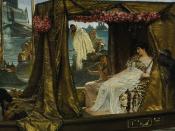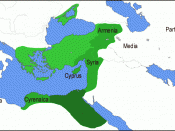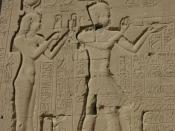Cleopatra VII
Ptolemy the XII had always felt that Rome's well organized army was much too powerful for Egypt's forces. Ptolemy had wisely thought to avoid fighting with Rome's powerful army and presented Pompey and Caesar with riches as well as the Roman promise of the Egyptian throne. Ptolemy had to borrow the money from Roman businessmen to pay Caesar and Pompey. When Ptolemy died he left the debt and the throne in the hands of his son and daughter, Ptolemy XIII and Cleopatra VII.
Cleopatra and Ptolemy were placed into marriage to secure the family name to the throne of Egypt. Cleopatra's marriage to her brother was politically driven, enraging the advisors to Cleopatra's younger brother; thus fueling the dispute between the influenced brother and a young royal female heir to a throne. Cleopatra's younger brother drove her out of the capital of Alexandria with the help of Ptolemy's advisors.
Cleopatra fled Alexandria, to Syria, where she formed a mercenary army to take back to Alexandria in hopes to overthrow her brother's position. In the meantime, Julius Caesar was arriving in Egypt to arbitrate the dispute between Cleopatra and Ptolemy at an arranged assembly. With Cleopatra being barred from the assembly, she derived a scheme that involved her advisor. The advisor was to take Cleopatra wrapped in a laundry roll, into the presence of Caesar. Cleopatra was going to sway Caesar's decision with youth and vivacious wit to regain control of Egypt. She did it.
Caesar's infatuation led him afloat a royal barge built for a queen, down the Nile on an excursion of luxury and privacy. Cleopatra would have been roughly twenty years old around the time she met Caesar. Cleopatra was young, exuberant and determined to keep herself as royalty, the way she liked it.
Cleopatra was a woman of power and royalty, she even considered herself divine. Cleopatra spoke nine languages and she was a philosopher, a poet, a politician, a goddess, as well as a warrior. Needless to say, Cleopatra was a well educated and courageous woman who was not innocent to the military field, even at her tender age. Cleopatra was a feminist soldier before her time, forming armies and easily persuading mighty Roman leaders, to politically sustain her reign as queen and pass on to future generations.
Eventually Caesar left Egypt to go back home. Caesar also left behind Cleopatra, as ruler of Egypt and pregnant. Cleopatra gave birth to Caesar's son, Caesarian. The child of Caesar and Cleopatra could have been the wealthiest Roman heir to eventually take rule. Cleopatra had planted her royal name into the seat of Roman lead, which stirred Romans' ideas and curiosity.
Roman political leaders felt that Cleopatra and Caesar's situation was motivation to position Caesar as king of Rome, perhaps it was. Cleopatra would have been the mother to the heir of the Roman throne. After Cleopatra had Caesarian, she and the child moved into an estate in Rome, owned by Caesar. Never did Caesar deny the child was his, and before Caesar could contemplate any further of becoming a king, he was assassinated. In fear of her own life, if she stayed in Rome, Cleopatra fled back to Egypt.
After Caesar's death, a struggle between the triumvirate of Lepidus, Mark Antony, who was Caesar's cousin, and Octavian began to escalate. The triumvirate broke up when Octavian gained control of Africa from Lepidus. Mark Antony, obvious to Octavian's movement, began to build an army. Antony sent message to Cleopatra, in Egypt, in hopes for her support. Cleopatra received the message and went to meet Antony in Egypt. As Caesar, Antony fell head over heels for Cleopatra. The queen of Egypt had won the heart of another powerful Roman. Cleopatra had found in Mark Antony another way into the seat of rule and Antony was truly in love with Cleopatra.
Cleopatra aided in the battle with sixty of her own ships against Octavian's fleet off the eastern coast of Actium. During the battle, the Roman ships maneuvered better than the Antony and Cleopatra's fleets and Cleopatra felt the battle was being lost, and she fled. The cowardice she showed during the battle broke the morale of Antony's men. Antony also left his men on the battle field to go after Cleopatra; making the Roman army that much more powerful.
Later, Octavian reached Alexandria and Antony's army met him on the battlefield, where his fleet and soldiers betrayed him and joined the Roman forces. Feeling betrayed by Cleopatra, Antony soon decided to commit suicide by stabbing himself in the stomach. Men soon came to find Antony to inform him that Cleopatra wished to see him. Antony spent his last breaths with Cleopatra; while she praised him as her lord and husband. Cleopatra felt pity for the father of two of her children, and praised Antony as being her lord and husband before he died. Antony had deserted his army and his position of royalty to follow his heart, and eventually his death.
Cleopatra soon followed in the footsteps of Antony by committing suicide as well. Some say she had a poisonous snake placed into a fig basket and delivered to her room for her last meal. As good as that sounds for television, the better theory states that she had dabbled in poisons and tested them on condemned prisoners as shown in a nineteenth century painting by Cabanel. Cleopatra was a very intelligent woman who most likely knew how quickly a poison could have killed her, and poisoned herself. After Cleopatra died, Egypt became a province of Rome.
Cleopatra's initiative to stay in control of the Egyptian throne keeps her in the ranks with all political and militant men of power to this day. Cleopatra had what no other ruler of her time had, and she knew exactly how to use it. With her intelligence, her vivaciousness, and her cunningness, Cleopatra was able to position herself and her heirs into royal rule over the foundations of modern civilization. Cleopatra's power as a woman is an inspiration to feminine equality, boldly facing even the most powerful men of all time.
References
Bennett, Chris. Cleopatra VII. 2009. Tyndalehouse.com. Web. April 17, 2010
http://www.tyndalehouse.com/Egypt/ptolemies/cleopatra_vii.htm
Crawford, Amy. Who Was Cleopatra? April 01, 2007. Smithsonian.com.
Web April 17, 2010. http://www.smithsonianmag.com/historyarchaeology/biography/cleopatra.html
Nola, Meg. Cleopatra in 19th Century Art. Suite101.com. Aug. 13, 2009.
Web. April 18, 2010.
http://19thcenturyart.suite101.com/article.cfm/cleopatrain19thcenturyart
SFUSD. The Deaths of Mark Antony and Cleopatra. Web April 17, 2010.
http://www.sfusd.k12.ca.us/schwww/sch618/romanlinks/Cleopatra3.html
Wedeman, Ben. Mysterious Cleopatra has 21st Century Defender. CNN.
CNN.com/world. April 20, 2009. Web. April 15, 2010. http://www.cnn.com/2009/WORLD/africa/04/19/egypt.cleopatra.mystery/
Womenintheancientworld.com. Cleopatra. Web. April 17, 2010.
http://www.womenintheancientworld.com/cleopatra.htm


